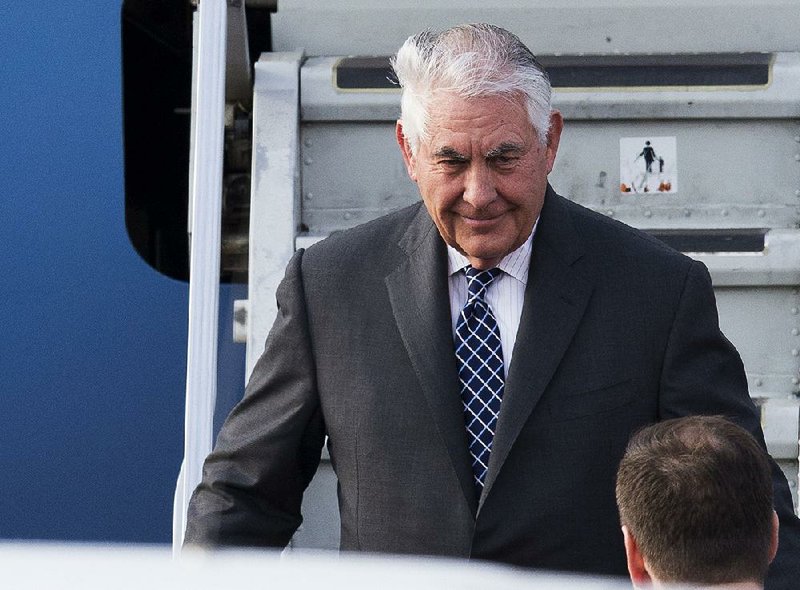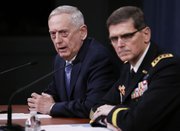MOSCOW -- U.S. Secretary of State Rex Tillerson arrived Tuesday in Moscow with an ultimatum for Russia: Side with the U.S. and like-minded countries on Syria, or embrace Iran, militant group Hezbollah and Syrian leader Bashar Assad.
RELATED ARTICLES
http://www.arkansas…">Spicer apologizes for Syria, Holocaust comparison http://www.arkansas…">Officials: FBI got court order last summer to monitor Trump adviser
Tillerson's mission comes as the White House accused the Russian government of engaging in a cover-up of the chemical-weapons attack last week by Syrian forces that prompted U.S. missile strikes. The White House said that U.S. intelligence and numerous contemporaneous reports confirmed that the Syrian government used sarin gas on its own people.
"I hope that what the Russian government concludes is that they have aligned themselves with an unreliable partner in Bashar al-Assad," Tillerson said, referring to Syria's leader.
"The reign of the Assad family is coming to an end," he said.
[PRESIDENT TRUMP: Timeline, appointments, executive orders + guide to actions in first 100 days]
The remarks at a Group of Seven foreign ministers' meeting in Italy came just before Tillerson flew to Moscow to meet with Russia's president, Vladimir Putin.
Putin, meanwhile, held to his claim that it was actually Assad opponents who introduced chemical weapons into Syria's civil war.
At an appearance with President Sergio Mattarella of Italy, Putin said Tuesday that the chemical attack was "worth investigating thoroughly," and said Russia would formally ask the Organization for the Prohibition of Chemical Weapons for an inquiry.
"We have seen it all already," Putin said, who reminded reporters about unfounded U.S. claims of Iraqi weapons of mass destruction, used to justify America's 2003 invasion.
The dispute over last week's attack in the Syrian town of Khan Sheikhoun, a rebel-held town in Idlib province, has thrust the U.S. and Russia into a level of tension rarely seen since the end of the Cold War.
"Russia is in an island on this," said Sean Spicer, the White House spokesman. He said there was little dispute about Syria's responsibility for the attack -- except by Moscow and the "failed states" of North Korea and Iran. "This is not exactly a happy-time cocktail party of people you want to be associated with."
Asked about Putin possibly skipping a meeting with Tillerson, Spicer said, "There is a bit of irony that for all of these talks that have been perpetuated about back channels and direct links, that now it's they won't meet with you."
At a minimum, Tillerson was to meet today with Russian Foreign Minister Sergey Lavrov, and the two are expected to take questions from reporters.
'Disinformation' claim
As Tillerson landed in Moscow, senior White House officials briefed reporters on declassified U.S. intelligence they said disproved Russia's claim that rebels were responsible for the chemical weapons. In an accompanying four-page memo, the U.S. accused Russia of a disinformation campaign and aiding Syria in covering up the attack, which killed more than 80 people.
"Russia's allegations fit with a pattern of deflecting blame from the regime and attempting to undermine the credibility of its opponents," the report read.
Senior White House officials, speaking on condition of anonymity to discuss the government's view, said Russia's goal was to cover up the Syrian government's culpability for the chemical attack. They asserted that the Syrian government, under pressure from opposition forces in the strategically vital Hama province and lacking sufficient troops to respond, used the lethal nerve agent sarin to retaliate against rebels who were threatening government-held territory.
Neither Spicer nor any of the officials who detailed the U.S. government's chronology of the chemical attack would comment on the possibility that the Russian government had known in advance of Syria's plan to carry it out.
But one official said that, given the history of close cooperation between the Syrian and Russian militaries, and that Russian forces were stationed at Al Shayrat airfield, which was used to launch the chemical attack, Moscow must answer.
"Moscow's response to the April 4 attack follows a familiar pattern of its responses to other egregious actions," the report said. "It spins out multiple, conflicting accounts in order to create confusion and sow doubt within the international community."
Much of the report was devoted to rebutting Russia's claim that the chemical attack last week was actually the result of a Syrian airstrike against a terrorist ammunition depot in Khan Sheikhoun that contained chemical weapons.
The report also cited a video and commercial satellite imagery that showed that the chemical weapon had landed in the middle of a road, not at a weapons facility.
White House officials said U.S. intelligence agencies do not believe that the Islamic State or other terrorist groups have sarin gas.
Defense Secretary James Mattis, speaking to reporters at the Pentagon, firmly placed blame on Assad's regime. "It is very clear who planned this attack, who authorized this attack and who orchestrated this attack," he said.
The report also rejected Moscow's claim that the April 4 attack was a "prank of a provocative nature" and denied Russian suggestions that the substance used might not have been sarin.
"Victims of the attack on April 4 displayed telltale symptoms of nerve agent exposure, including pinpoint pupils, foaming at the nose and mouth, and twitching," the report said.
Putin's government has been incensed by the Trump administration's public accusations, and even more so by U.S. military intervention in Syria. The retaliatory strikes, which Obama declined to approve after blaming Assad for an even deadlier chemical weapons attack in 2013, hit an air base where Russian troops also were present, although none is believed to have been killed.
Sarin confirmation
Meanwhile, Turkey's health minister said Tuesday that test results confirm sarin gas was used in the attack on Khan Sheikhoun.
Health Minister Recep Akdag said test results conducted on the victims confirm that sarin gas was used. Akdag said that blood and urine samples confirmed that the victims were subjected to the nerve agent. His comments were reported by the state-run Anadolu news agency.
Turkey last week conducted autopsies on three victims of the gas attack who were taken from Syria. Officials from the World Health Organization and the Organization for the Prohibition of Chemical Weapons participated in the autopsies.
In Damascus, a Syrian official said Foreign Minister Walid al-Moallem will visit Russia on Thursday where he will meet with officials in Moscow.
The official, who spoke on condition of anonymity in line with regulations, said Tuesday that there might be a three-way meeting later this week in Moscow of officials from Russia, Syria and Iran.
Syrian government forces battling insurgents in Daraa have dropped several barrel bombs on the southern city, opposition activists said Tuesday, a day after the White House suggested that the use of the crude explosive devices could provoke a U.S. response.
Russia's Defense Ministry meanwhile said two of its army officers were killed and a third seriously wounded in a mortar attack in Syria, without specifying when or where it took place. Russia has been waging an air campaign in support of Syrian forces since 2015.
The Britain-based Syrian Observatory for Human Rights said the fighting in Daraa flared Monday when rebels attacked a government-held area in the city center. It said 16 pro-government fighters, including an army colonel, have been killed.
Both the Observatory and Daraa-based activist Ahmad al-Masalmeh said warplanes carried out raids on Daraa while helicopter gunships dropped at least 14 barrels loaded with explosives.
Information for this article was contributed by Josh Lederman, Vivian Salama, Bassem Mroue, Philip Issa, Nataliya Vasilyeva, Suzan Fraser and Albert Aji of The Associated Press and by Julie Hirschfeld Davis, Gardiner Harris, Oleg Matsnev and Ivan Nechepurenko of The New York Times.
A Section on 04/12/2017

